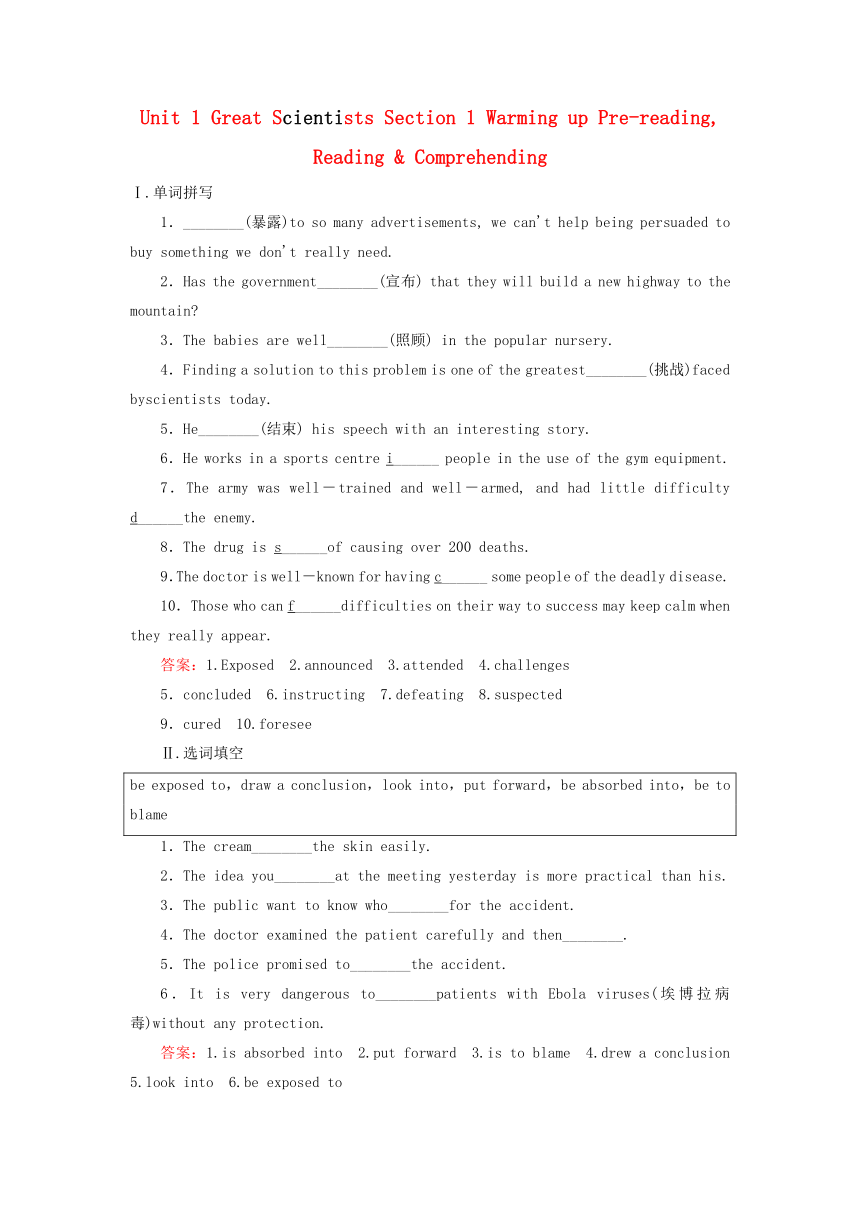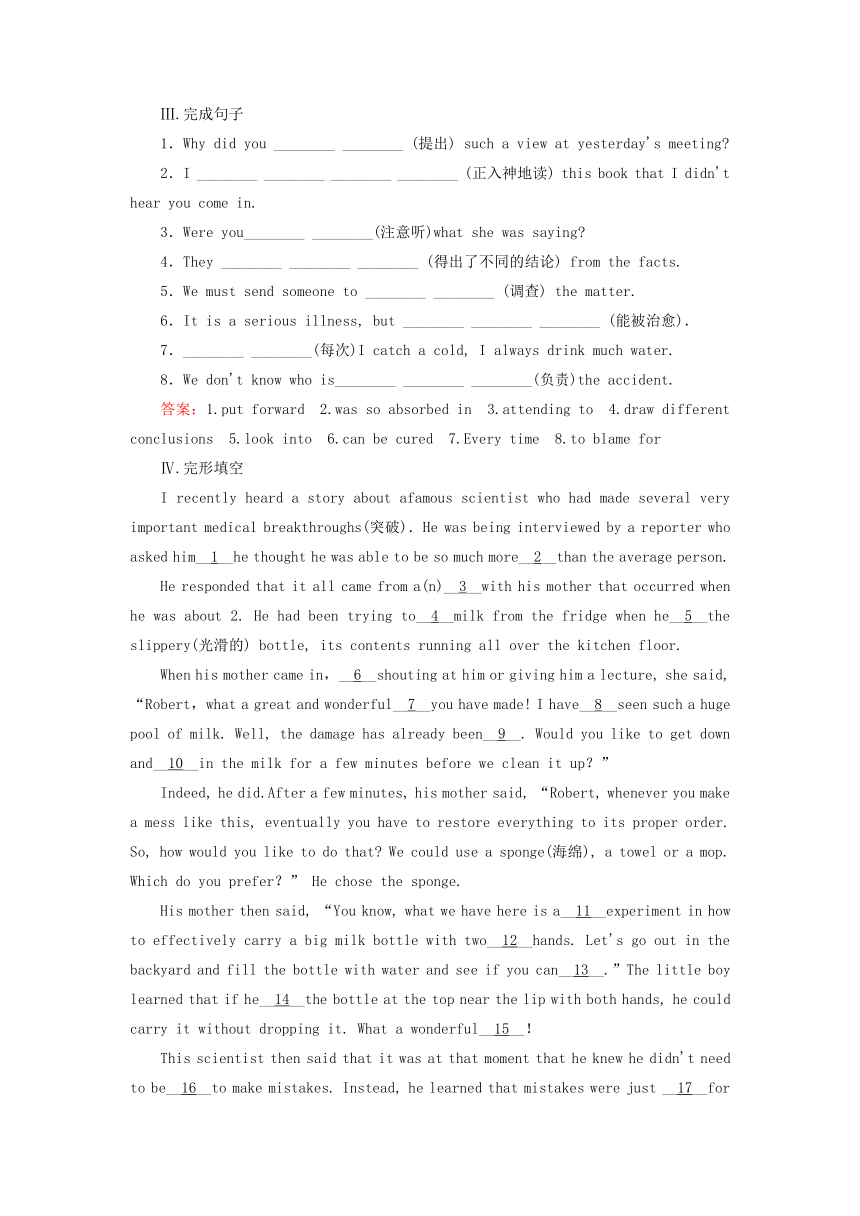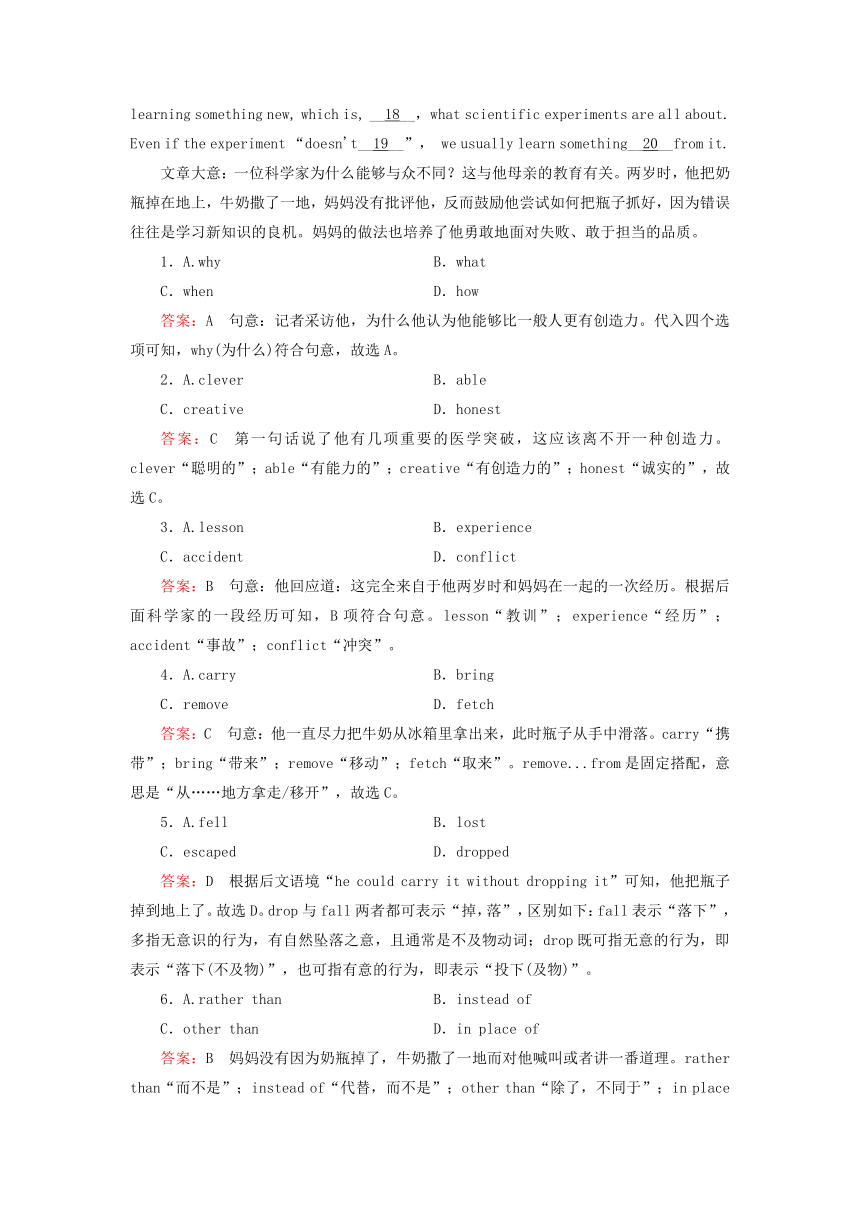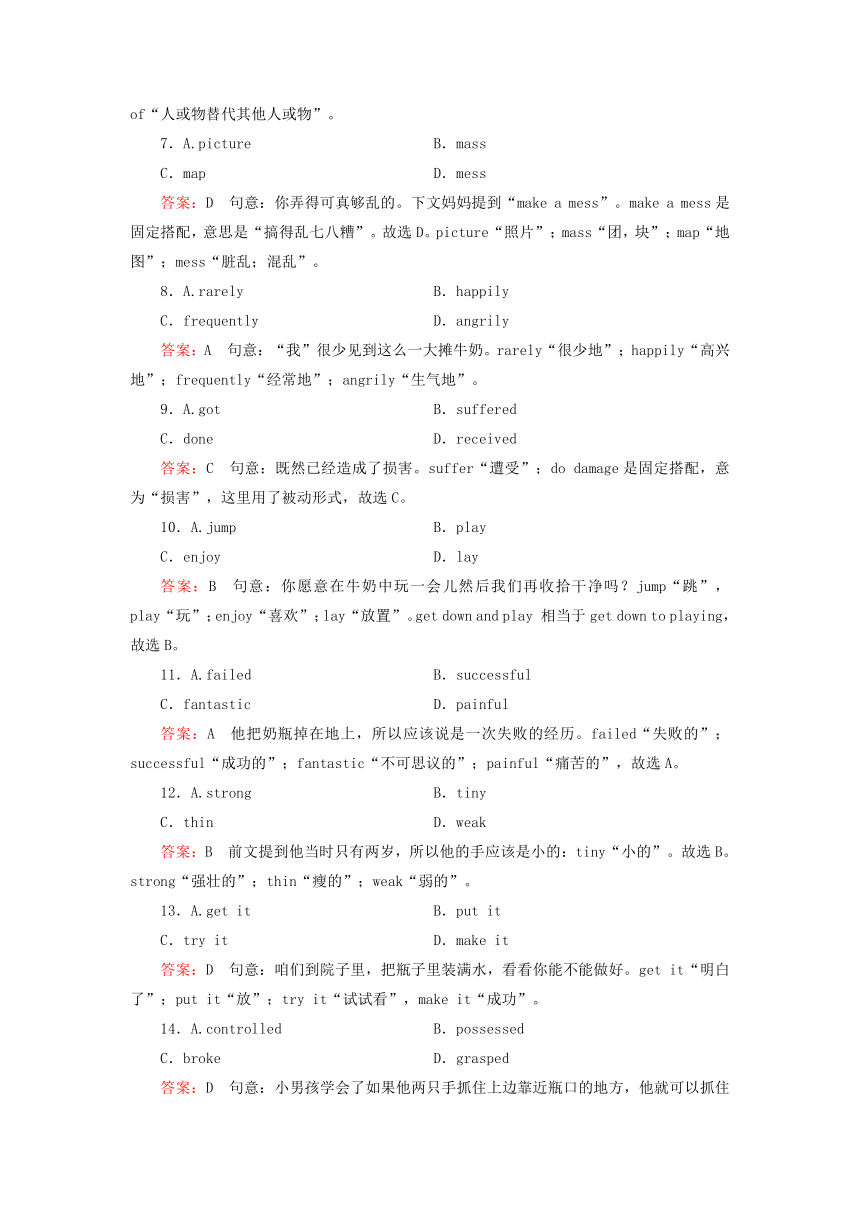2016年春高中英语 Unit 1 Great Scientists Section 1 Warming up Pre-reading, Reading & Comprehending同步测试(含部分
文档属性
| 名称 | 2016年春高中英语 Unit 1 Great Scientists Section 1 Warming up Pre-reading, Reading & Comprehending同步测试(含部分 |  | |
| 格式 | zip | ||
| 文件大小 | 20.1KB | ||
| 资源类型 | 教案 | ||
| 版本资源 | 人教版(新课程标准) | ||
| 科目 | 英语 | ||
| 更新时间 | 2016-04-20 08:41:16 | ||
图片预览




文档简介
Unit 1 Great Scientists Section 1 Warming up Pre-reading, Reading & Comprehending
Ⅰ.单词拼写
1.________(暴露)to so many advertisements, we can't help being persuaded to buy something we don't really need.
2.Has the government________(宣布) that they will build a new highway to the mountain
3.The babies are well________(照顾) in the popular nursery.
4.Finding a solution to this problem is one of the greatest________(挑战)faced byscientists today.
5.He________(结束) his speech with an interesting story.
6.He works in a sports centre i______ people in the use of the gym equipment.
7.The army was well-trained and well-armed, and had little difficulty d______the enemy.
8.The drug is s______of causing over 200 deaths.
9.The doctor is well-known for having c______ some people of the deadly disease.
10.Those who can f______difficulties on their way to success may keep calm when they really appear.
答案:1.Exposed 2.announced 3.attended 4.challenges
5.concluded 6.instructing 7.defeating 8.suspected
9.cured 10.foresee
Ⅱ.选词填空
be exposed to,draw a conclusion,look into,put forward,be absorbed into,be to blame
1.The cream________the skin easily.
2.The idea you________at the meeting yesterday is more practical than his.
3.The public want to know who________for the accident.
4.The doctor examined the patient carefully and then________.
5.The police promised to________the accident.
6.It is very dangerous to________patients with Ebola viruses(埃博拉病毒)without any protection.
答案:1.is absorbed into 2.put forward 3.is to blame 4.drew a conclusion 5.look into 6.be exposed to
Ⅲ.完成句子
1.Why did you ________ ________ (提出) such a view at yesterday's meeting
2.I ________ ________ ________ ________ (正入神地读) this book that I didn't hear you come in.
3.Were you________ ________(注意听)what she was saying
4.They ________ ________ ________ (得出了不同的结论) from the facts.
5.We must send someone to ________ ________ (调查) the matter.
6.It is a serious illness, but ________ ________ ________ (能被治愈).
7.________ ________(每次)I catch a cold, I always drink much water.
8.We don't know who is________ ________ ________(负责)the accident.
答案:1.put forward 2.was so absorbed in 3.attending to 4.draw different conclusions 5.look into 6.can be cured 7.Every time 8.to blame for
Ⅳ.完形填空
I recently heard a story about afamous scientist who had made several very important medical breakthroughs(突破).He was being interviewed by a reporter who asked him__1__he thought he was able to be so much more__2__than the average person.
He responded that it all came from a(n)__3__with his mother that occurred when he was about 2. He had been trying to__4__milk from the fridge when he__5__the slippery(光滑的) bottle, its contents running all over the kitchen floor.
When his mother came in,__6__shouting at him or giving him a lecture, she said, “Robert,what a great and wonderful__7__you have made! I have__8__seen such a huge pool of milk. Well, the damage has already been__9__. Would you like to get down and__10__in the milk for a few minutes before we clean it up?”
Indeed, he did.After a few minutes, his mother said, “Robert, whenever you make a mess like this, eventually you have to restore everything to its proper order. So, how would you like to do that We could use a sponge(海绵), a towel or a mop. Which do you prefer?” He chose the sponge.
His mother then said, “You know, what we have here is a__11__experiment in how to effectively carry a big milk bottle with two__12__hands. Let's go out in the backyard and fill the bottle with water and see if you can__13__.”The little boy learned that if he__14__the bottle at the top near the lip with both hands, he could carry it without dropping it. What a wonderful__15__!
This scientist then said that it was at that moment that he knew he didn't need to be__16__to make mistakes. Instead, he learned that mistakes were just __17__for learning something new, which is, __18__,what scientific experiments are all about. Even if the experiment “doesn't__19__”, we usually learn something__20__from it.
文章大意:一位科学家为什么能够与众不同?这与他母亲的教育有关。两岁时,他把奶瓶掉在地上,牛奶撒了一地,妈妈没有批评他,反而鼓励他尝试如何把瓶子抓好,因为错误往往是学习新知识的良机。妈妈的做法也培养了他勇敢地面对失败、敢于担当的品质。
1.A.why B.what
C.when D.how
答案:A 句意:记者采访他,为什么他认为他能够比一般人更有创造力。代入四个选项可知,why(为什么)符合句意,故选A。
2.A.clever B.able
C.creative D.honest
答案:C 第一句话说了他有几项重要的医学突破,这应该离不开一种创造力。clever“聪明的”;able“有能力的”;creative“有创造力的”;honest“诚实的”,故选C。
3.A.lesson B.experience
C.accident D.conflict
答案:B 句意:他回应道:这完全来自于他两岁时和妈妈在一起的一次经历。根据后面科学家的一段经历可知,B项符合句意。lesson“教训”;experience“经历”;accident“事故”;conflict“冲突”。
4.A.carry B.bring
C.remove D.fetch
答案:C 句意:他一直尽力把牛奶从冰箱里拿出来,此时瓶子从手中滑落。carry“携带”;bring“带来”;remove“移动”;fetch“取来”。remove...from是固定搭配,意思是“从……地方拿走/移开”,故选C。
5.A.fell B.lost
C.escaped D.dropped
答案:D 根据后文语境“he could carry it without dropping it”可知,他把瓶子掉到地上了。故选D。drop与fall两者都可表示“掉,落”,区别如下:fall表示“落下”,多指无意识的行为,有自然坠落之意,且通常是不及物动词;drop既可指无意的行为,即表示“落下(不及物)”,也可指有意的行为,即表示“投下(及物)”。
6.A.rather than B.instead of
C.other than D.in place of
答案:B 妈妈没有因为奶瓶掉了,牛奶撒了一地而对他喊叫或者讲一番道理。rather than“而不是”;instead of“代替,而不是”;other than“除了,不同于”;in place of“人或物替代其他人或物”。
7.A.picture B.mass
C.map D.mess
答案:D 句意:你弄得可真够乱的。下文妈妈提到“make a mess”。make a mess是固定搭配,意思是“搞得乱七八糟”。故选D。picture“照片”;mass“团,块”;map“地图”;mess“脏乱;混乱”。
8.A.rarely B.happily
C.frequently D.angrily
答案:A 句意:“我”很少见到这么一大摊牛奶。rarely“很少地”;happily“高兴地”;frequently“经常地”;angrily“生气地”。
9.A.got B.suffered
C.done D.received
答案:C 句意:既然已经造成了损害。suffer“遭受”;do damage是固定搭配,意为“损害”,这里用了被动形式,故选C。
10.A.jump B.play
C.enjoy D.lay
答案:B 句意:你愿意在牛奶中玩一会儿然后我们再收拾干净吗?jump“跳”,play“玩”;enjoy“喜欢”;lay“放置”。get down and play 相当于get down to playing,故选B。
11.A.failed B.successful
C.fantastic D.painful
答案:A 他把奶瓶掉在地上,所以应该说是一次失败的经历。failed“失败的”;successful“成功的”;fantastic“不可思议的”;painful“痛苦的”,故选A。
12.A.strong B.tiny
C.thin D.weak
答案:B 前文提到他当时只有两岁,所以他的手应该是小的:tiny“小的”。故选B。strong“强壮的”;thin“瘦的”;weak“弱的”。
13.A.get it B.put it
C.try it D.make it
答案:D 句意:咱们到院子里,把瓶子里装满水,看看你能不能做好。get it“明白了”;put it“放”;try it“试试看”,make it“成功”。
14.A.controlled B.possessed
C.broke D.grasped
答案:D 句意:小男孩学会了如果他两只手抓住上边靠近瓶口的地方,他就可以抓住奶瓶不掉落了。control“控制”;possess“拥有”;break“打碎”;grasp“掌握,抓住”,故选D。
15.A.example B.teaching
C.lesson D.instruction
答案:C 通过自己亲手做让孩子知道怎么做,这一课上得很精彩。example“例子”;teaching“教学”;lesson“课,教训”;instruction“命令;指示”,故选C。
16.A.anxious B.nervous
C.fearful D.afraid
答案:D 句意:科学家在那一刻也明白了他不必害怕犯错误。anxious“焦虑的”;nervous“紧张的”;fearful“可怕的”;afraid“害怕的”。固定短语be afraid to do sth.意为“不敢做某事”,故选D。
17.A.situations B.opportunities
C.times D.turns
答案:B 句意:他懂得了错误只是他学习新东西的机会。situation“局面”;opportunity“机会”;time“时代,次数”;turn“转弯”,故选B。
18.A.after all B.above all
C.first of all D.in all
答案:A 句意:通过以上的经历,科学家的感受是:科学实验终究是试验一个又一个的错误。after all“毕竟;终究”;above all“最重要的是”;first of all“首先;第一”;in all“总共;合计”。
19.A.do B.finish
C.go D.work
答案:D 句意:即使实验不成功,我们通常也可以学到有价值的东西。work“工作;起作用”,故选D。do“做”;finish“完成”;go“去;前往”。
20.A.worthy B.costly
C.valuable D.interesting
答案:C 句意:即使实验不成功,我们通常也可以学到有价值的东西。worthy“值得的”;costly“昂贵的”;valuable“贵重的,有价值的”;interesting“有趣的”,故选C。
Ⅴ.阅读理解
Louis Pasteur, the famous French chemist and bacteriologist, invented “pasteurization”.In 1854 Pasteur was made head of the department of science at the University of Lille, and it was there that he made one of his most famous discoveries. Lille was a major center for wine and beer-making, and some of the local wine-makers asked Pasteur if he could help solve the problem of keeping wine fresh.At that time, it was believed that food and drinks went “bad” because of a purely chemical process (变化过程). But during a series of experiments Pasteur proved that tiny living organisms(微生物) caused food and drinks to go bad. In the case of wine and beer, the organisms are already present in the form of the various yeasts (酵母)that caused the fermentation(发酵) process. Pasteur discovered that heating the wine gently for a few minutes after it had fermented would kill off the yeast that was left in the wine, with the result that the wine would remain fresh for much longer. He also proved that food and drinks could be turned bad by other organisms that were present in the air,and that they would keep fresh much longer if they were kept in airtight containers.
The heating process was so successful that it made Pasteur famous. It was named “pasteurization” in his honour, and by about 1900 it had been widely used for processing and bottling cows' milk. The result was a huge drop in the number of bottle-fed babies dying from infant diarrhea(婴儿腹泻) and from that time on it has been a standard treatment for milk and many other food products. Thissimple process has saved thousands, possibly millions, of lives worldwide.
文章大意: 本文主要介绍了法国人路易斯·巴斯德通过实验,探索出巴氏杀菌法的过程,以及这一方法对食品储存保鲜方面作出的巨大贡献。
1.Pasteur became________in 1854.
A.the chairperson of the science department at the University of Lille
B.the director of a chemical laboratory at the University of Lille
C.the general manager of a large beer-making company
D.the president of the University of Lille
答案:A 细节理解题。从第一段第二句话“In 1854 Pasteur was made head of the department of science at the University of Lille...”一句可知答案。
2.According to the passage,Lille was a major center for________in the mid-19th century.
A.growing grain crops
B.making beer and wine
C.doing chemical research
D.producing various kinds of yeasts
答案:B 细节理解题。从第一段中第三句话“Lille was a major center for wine and beer-making, and some of the local wine-makers asked Pasteur if he could help solve the problem of keeping wine fresh.”可知答案
3.In the last sentence of Paragraph 1, the underlined word “they” refers to________.
A.wine and beer B. food and drinks
C.the various yeasts D.other organisms
答案:B 词义指代题。从第一段最后一句话可知they指的是food and drinks。
4.Wecaninferfromthepassagethat Pasteur's discovery________.
A.is no longer widely used for treating milk and other food products
B.did not bring much profit to the wine-makers in Lille
C.has done a lot of good to children in the world
D.has greatly reduced the number of wars in the world
答案:C 推理判断题。短文的最后一段讲述了在1900年巴斯德所发明的防止食物和酒变质的方法广泛应用于儿童所饮用的瓶装牛奶,使世界上成千上万的儿童免于死亡。
Ⅵ.七选五
根据短文内容,从短文后的选项中选出能填入空白处的最佳选项。选项中有两项为多余选项。
Forgiveness
To forgive is a virtue, but no one has ever said it is easy. When someone has deeply hurt you, it can be extremely difficult to let go of your hate. However, forgiveness is possible, and it can be surprisingly beneficial to your physical and mental health. People who forgive show less sadness, anger and stress and more hopefulness, according to a recent research.
__1__Try the following steps:
Calm yourself.__2__You can take a couple of breaths and think of something that gives you pleasure: a beautiful scene in nature, or someone you love.
Don't wait for an apology. Many times the person who hurt you does not intend to apologize. They may have wanted to hurt you or they just don't see things the same way. __3__Keep in mind that forgiveness does not necessarily mean becoming friends again with the person who upset you.
Take the control away from your offender(冒犯者). Rethinking about you hurt gives power to the person who causes you pain. Instead of focusing on your mounded feelings, learn to look for the love, beauty and kindness around you.
__4__If you understand your offender, you may realize that he or she was acting out of unawareness, fear, and even love. You may want to write a letter to yourself from your offender's point of view.
Don't forget to forgive yourself.__5__But it can rob you of your self-confidence if you don't do it.
A.Why should you forgive
B.How should you start to forgive
C.Recognize the benefits of forgiveness.
D.Try to see things from your offender's angle.
E.For some people, forgiving themselves is the biggest challenge.
F.To make your anger die away, try a simple stress-management technique.
G.If you wait for people to apologize, you could be waiting an awfully long time.
答案:1—5 BFGDE
Ⅰ.单词拼写
1.________(暴露)to so many advertisements, we can't help being persuaded to buy something we don't really need.
2.Has the government________(宣布) that they will build a new highway to the mountain
3.The babies are well________(照顾) in the popular nursery.
4.Finding a solution to this problem is one of the greatest________(挑战)faced byscientists today.
5.He________(结束) his speech with an interesting story.
6.He works in a sports centre i______ people in the use of the gym equipment.
7.The army was well-trained and well-armed, and had little difficulty d______the enemy.
8.The drug is s______of causing over 200 deaths.
9.The doctor is well-known for having c______ some people of the deadly disease.
10.Those who can f______difficulties on their way to success may keep calm when they really appear.
答案:1.Exposed 2.announced 3.attended 4.challenges
5.concluded 6.instructing 7.defeating 8.suspected
9.cured 10.foresee
Ⅱ.选词填空
be exposed to,draw a conclusion,look into,put forward,be absorbed into,be to blame
1.The cream________the skin easily.
2.The idea you________at the meeting yesterday is more practical than his.
3.The public want to know who________for the accident.
4.The doctor examined the patient carefully and then________.
5.The police promised to________the accident.
6.It is very dangerous to________patients with Ebola viruses(埃博拉病毒)without any protection.
答案:1.is absorbed into 2.put forward 3.is to blame 4.drew a conclusion 5.look into 6.be exposed to
Ⅲ.完成句子
1.Why did you ________ ________ (提出) such a view at yesterday's meeting
2.I ________ ________ ________ ________ (正入神地读) this book that I didn't hear you come in.
3.Were you________ ________(注意听)what she was saying
4.They ________ ________ ________ (得出了不同的结论) from the facts.
5.We must send someone to ________ ________ (调查) the matter.
6.It is a serious illness, but ________ ________ ________ (能被治愈).
7.________ ________(每次)I catch a cold, I always drink much water.
8.We don't know who is________ ________ ________(负责)the accident.
答案:1.put forward 2.was so absorbed in 3.attending to 4.draw different conclusions 5.look into 6.can be cured 7.Every time 8.to blame for
Ⅳ.完形填空
I recently heard a story about afamous scientist who had made several very important medical breakthroughs(突破).He was being interviewed by a reporter who asked him__1__he thought he was able to be so much more__2__than the average person.
He responded that it all came from a(n)__3__with his mother that occurred when he was about 2. He had been trying to__4__milk from the fridge when he__5__the slippery(光滑的) bottle, its contents running all over the kitchen floor.
When his mother came in,__6__shouting at him or giving him a lecture, she said, “Robert,what a great and wonderful__7__you have made! I have__8__seen such a huge pool of milk. Well, the damage has already been__9__. Would you like to get down and__10__in the milk for a few minutes before we clean it up?”
Indeed, he did.After a few minutes, his mother said, “Robert, whenever you make a mess like this, eventually you have to restore everything to its proper order. So, how would you like to do that We could use a sponge(海绵), a towel or a mop. Which do you prefer?” He chose the sponge.
His mother then said, “You know, what we have here is a__11__experiment in how to effectively carry a big milk bottle with two__12__hands. Let's go out in the backyard and fill the bottle with water and see if you can__13__.”The little boy learned that if he__14__the bottle at the top near the lip with both hands, he could carry it without dropping it. What a wonderful__15__!
This scientist then said that it was at that moment that he knew he didn't need to be__16__to make mistakes. Instead, he learned that mistakes were just __17__for learning something new, which is, __18__,what scientific experiments are all about. Even if the experiment “doesn't__19__”, we usually learn something__20__from it.
文章大意:一位科学家为什么能够与众不同?这与他母亲的教育有关。两岁时,他把奶瓶掉在地上,牛奶撒了一地,妈妈没有批评他,反而鼓励他尝试如何把瓶子抓好,因为错误往往是学习新知识的良机。妈妈的做法也培养了他勇敢地面对失败、敢于担当的品质。
1.A.why B.what
C.when D.how
答案:A 句意:记者采访他,为什么他认为他能够比一般人更有创造力。代入四个选项可知,why(为什么)符合句意,故选A。
2.A.clever B.able
C.creative D.honest
答案:C 第一句话说了他有几项重要的医学突破,这应该离不开一种创造力。clever“聪明的”;able“有能力的”;creative“有创造力的”;honest“诚实的”,故选C。
3.A.lesson B.experience
C.accident D.conflict
答案:B 句意:他回应道:这完全来自于他两岁时和妈妈在一起的一次经历。根据后面科学家的一段经历可知,B项符合句意。lesson“教训”;experience“经历”;accident“事故”;conflict“冲突”。
4.A.carry B.bring
C.remove D.fetch
答案:C 句意:他一直尽力把牛奶从冰箱里拿出来,此时瓶子从手中滑落。carry“携带”;bring“带来”;remove“移动”;fetch“取来”。remove...from是固定搭配,意思是“从……地方拿走/移开”,故选C。
5.A.fell B.lost
C.escaped D.dropped
答案:D 根据后文语境“he could carry it without dropping it”可知,他把瓶子掉到地上了。故选D。drop与fall两者都可表示“掉,落”,区别如下:fall表示“落下”,多指无意识的行为,有自然坠落之意,且通常是不及物动词;drop既可指无意的行为,即表示“落下(不及物)”,也可指有意的行为,即表示“投下(及物)”。
6.A.rather than B.instead of
C.other than D.in place of
答案:B 妈妈没有因为奶瓶掉了,牛奶撒了一地而对他喊叫或者讲一番道理。rather than“而不是”;instead of“代替,而不是”;other than“除了,不同于”;in place of“人或物替代其他人或物”。
7.A.picture B.mass
C.map D.mess
答案:D 句意:你弄得可真够乱的。下文妈妈提到“make a mess”。make a mess是固定搭配,意思是“搞得乱七八糟”。故选D。picture“照片”;mass“团,块”;map“地图”;mess“脏乱;混乱”。
8.A.rarely B.happily
C.frequently D.angrily
答案:A 句意:“我”很少见到这么一大摊牛奶。rarely“很少地”;happily“高兴地”;frequently“经常地”;angrily“生气地”。
9.A.got B.suffered
C.done D.received
答案:C 句意:既然已经造成了损害。suffer“遭受”;do damage是固定搭配,意为“损害”,这里用了被动形式,故选C。
10.A.jump B.play
C.enjoy D.lay
答案:B 句意:你愿意在牛奶中玩一会儿然后我们再收拾干净吗?jump“跳”,play“玩”;enjoy“喜欢”;lay“放置”。get down and play 相当于get down to playing,故选B。
11.A.failed B.successful
C.fantastic D.painful
答案:A 他把奶瓶掉在地上,所以应该说是一次失败的经历。failed“失败的”;successful“成功的”;fantastic“不可思议的”;painful“痛苦的”,故选A。
12.A.strong B.tiny
C.thin D.weak
答案:B 前文提到他当时只有两岁,所以他的手应该是小的:tiny“小的”。故选B。strong“强壮的”;thin“瘦的”;weak“弱的”。
13.A.get it B.put it
C.try it D.make it
答案:D 句意:咱们到院子里,把瓶子里装满水,看看你能不能做好。get it“明白了”;put it“放”;try it“试试看”,make it“成功”。
14.A.controlled B.possessed
C.broke D.grasped
答案:D 句意:小男孩学会了如果他两只手抓住上边靠近瓶口的地方,他就可以抓住奶瓶不掉落了。control“控制”;possess“拥有”;break“打碎”;grasp“掌握,抓住”,故选D。
15.A.example B.teaching
C.lesson D.instruction
答案:C 通过自己亲手做让孩子知道怎么做,这一课上得很精彩。example“例子”;teaching“教学”;lesson“课,教训”;instruction“命令;指示”,故选C。
16.A.anxious B.nervous
C.fearful D.afraid
答案:D 句意:科学家在那一刻也明白了他不必害怕犯错误。anxious“焦虑的”;nervous“紧张的”;fearful“可怕的”;afraid“害怕的”。固定短语be afraid to do sth.意为“不敢做某事”,故选D。
17.A.situations B.opportunities
C.times D.turns
答案:B 句意:他懂得了错误只是他学习新东西的机会。situation“局面”;opportunity“机会”;time“时代,次数”;turn“转弯”,故选B。
18.A.after all B.above all
C.first of all D.in all
答案:A 句意:通过以上的经历,科学家的感受是:科学实验终究是试验一个又一个的错误。after all“毕竟;终究”;above all“最重要的是”;first of all“首先;第一”;in all“总共;合计”。
19.A.do B.finish
C.go D.work
答案:D 句意:即使实验不成功,我们通常也可以学到有价值的东西。work“工作;起作用”,故选D。do“做”;finish“完成”;go“去;前往”。
20.A.worthy B.costly
C.valuable D.interesting
答案:C 句意:即使实验不成功,我们通常也可以学到有价值的东西。worthy“值得的”;costly“昂贵的”;valuable“贵重的,有价值的”;interesting“有趣的”,故选C。
Ⅴ.阅读理解
Louis Pasteur, the famous French chemist and bacteriologist, invented “pasteurization”.In 1854 Pasteur was made head of the department of science at the University of Lille, and it was there that he made one of his most famous discoveries. Lille was a major center for wine and beer-making, and some of the local wine-makers asked Pasteur if he could help solve the problem of keeping wine fresh.At that time, it was believed that food and drinks went “bad” because of a purely chemical process (变化过程). But during a series of experiments Pasteur proved that tiny living organisms(微生物) caused food and drinks to go bad. In the case of wine and beer, the organisms are already present in the form of the various yeasts (酵母)that caused the fermentation(发酵) process. Pasteur discovered that heating the wine gently for a few minutes after it had fermented would kill off the yeast that was left in the wine, with the result that the wine would remain fresh for much longer. He also proved that food and drinks could be turned bad by other organisms that were present in the air,and that they would keep fresh much longer if they were kept in airtight containers.
The heating process was so successful that it made Pasteur famous. It was named “pasteurization” in his honour, and by about 1900 it had been widely used for processing and bottling cows' milk. The result was a huge drop in the number of bottle-fed babies dying from infant diarrhea(婴儿腹泻) and from that time on it has been a standard treatment for milk and many other food products. Thissimple process has saved thousands, possibly millions, of lives worldwide.
文章大意: 本文主要介绍了法国人路易斯·巴斯德通过实验,探索出巴氏杀菌法的过程,以及这一方法对食品储存保鲜方面作出的巨大贡献。
1.Pasteur became________in 1854.
A.the chairperson of the science department at the University of Lille
B.the director of a chemical laboratory at the University of Lille
C.the general manager of a large beer-making company
D.the president of the University of Lille
答案:A 细节理解题。从第一段第二句话“In 1854 Pasteur was made head of the department of science at the University of Lille...”一句可知答案。
2.According to the passage,Lille was a major center for________in the mid-19th century.
A.growing grain crops
B.making beer and wine
C.doing chemical research
D.producing various kinds of yeasts
答案:B 细节理解题。从第一段中第三句话“Lille was a major center for wine and beer-making, and some of the local wine-makers asked Pasteur if he could help solve the problem of keeping wine fresh.”可知答案
3.In the last sentence of Paragraph 1, the underlined word “they” refers to________.
A.wine and beer B. food and drinks
C.the various yeasts D.other organisms
答案:B 词义指代题。从第一段最后一句话可知they指的是food and drinks。
4.Wecaninferfromthepassagethat Pasteur's discovery________.
A.is no longer widely used for treating milk and other food products
B.did not bring much profit to the wine-makers in Lille
C.has done a lot of good to children in the world
D.has greatly reduced the number of wars in the world
答案:C 推理判断题。短文的最后一段讲述了在1900年巴斯德所发明的防止食物和酒变质的方法广泛应用于儿童所饮用的瓶装牛奶,使世界上成千上万的儿童免于死亡。
Ⅵ.七选五
根据短文内容,从短文后的选项中选出能填入空白处的最佳选项。选项中有两项为多余选项。
Forgiveness
To forgive is a virtue, but no one has ever said it is easy. When someone has deeply hurt you, it can be extremely difficult to let go of your hate. However, forgiveness is possible, and it can be surprisingly beneficial to your physical and mental health. People who forgive show less sadness, anger and stress and more hopefulness, according to a recent research.
__1__Try the following steps:
Calm yourself.__2__You can take a couple of breaths and think of something that gives you pleasure: a beautiful scene in nature, or someone you love.
Don't wait for an apology. Many times the person who hurt you does not intend to apologize. They may have wanted to hurt you or they just don't see things the same way. __3__Keep in mind that forgiveness does not necessarily mean becoming friends again with the person who upset you.
Take the control away from your offender(冒犯者). Rethinking about you hurt gives power to the person who causes you pain. Instead of focusing on your mounded feelings, learn to look for the love, beauty and kindness around you.
__4__If you understand your offender, you may realize that he or she was acting out of unawareness, fear, and even love. You may want to write a letter to yourself from your offender's point of view.
Don't forget to forgive yourself.__5__But it can rob you of your self-confidence if you don't do it.
A.Why should you forgive
B.How should you start to forgive
C.Recognize the benefits of forgiveness.
D.Try to see things from your offender's angle.
E.For some people, forgiving themselves is the biggest challenge.
F.To make your anger die away, try a simple stress-management technique.
G.If you wait for people to apologize, you could be waiting an awfully long time.
答案:1—5 BFGDE
